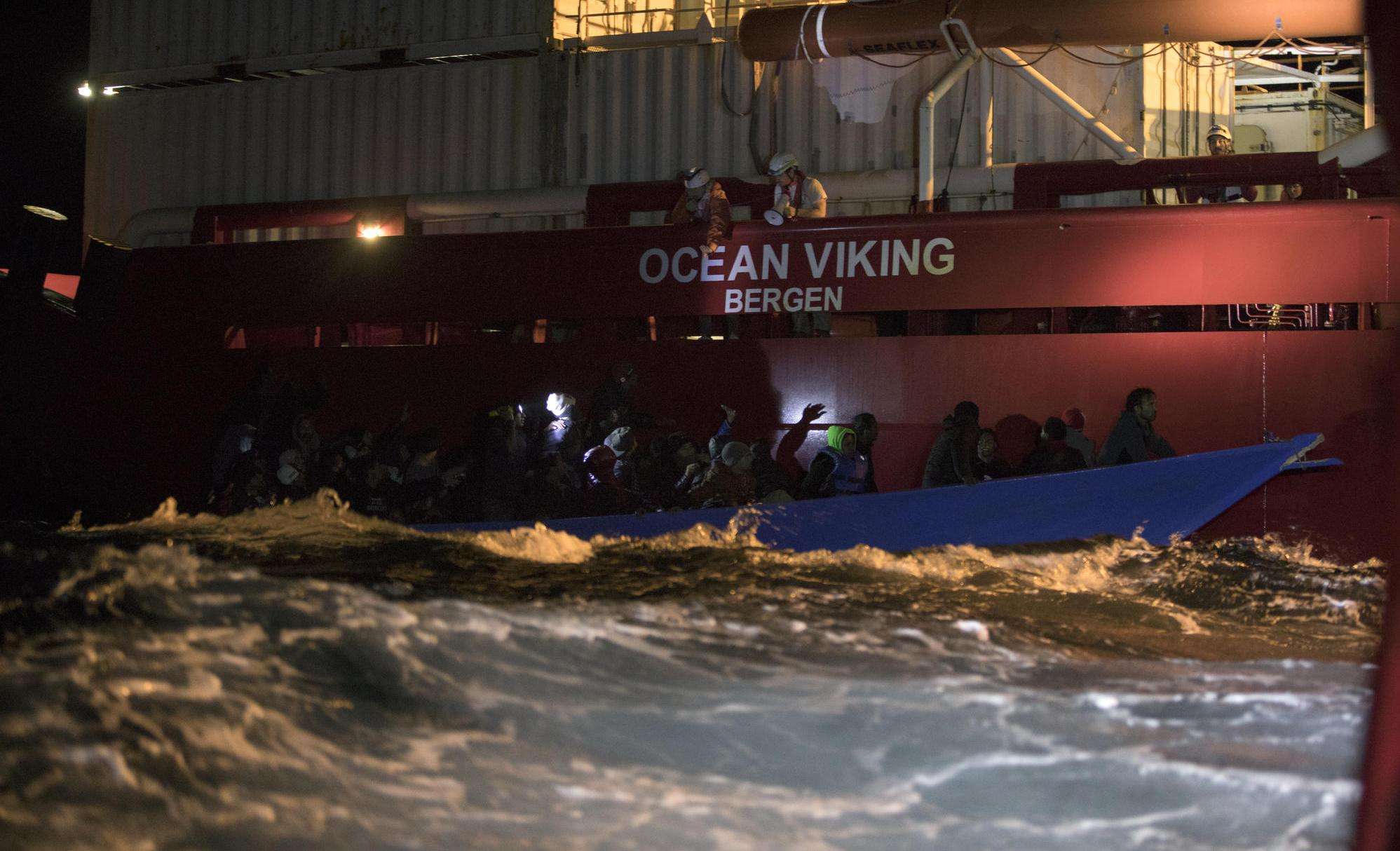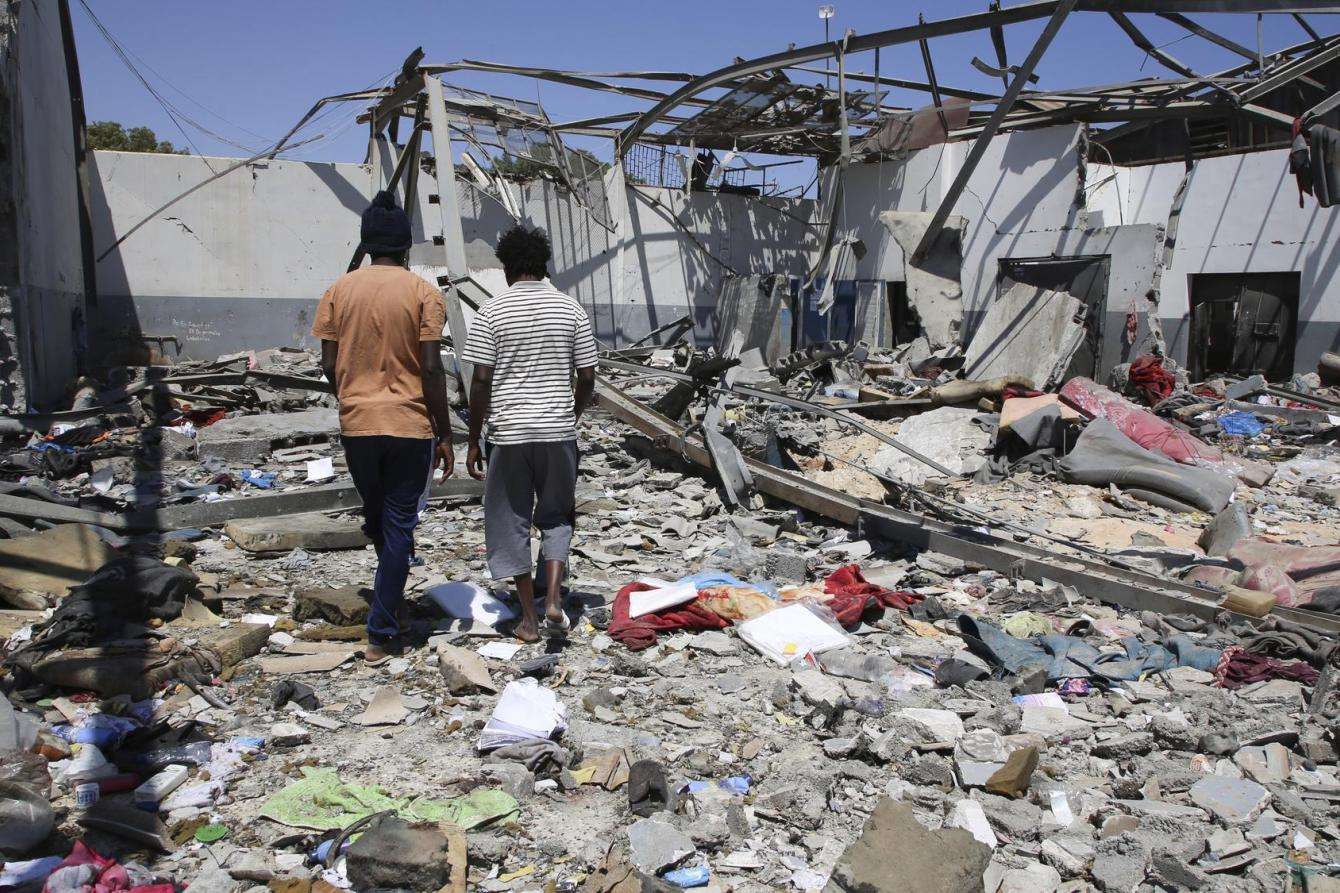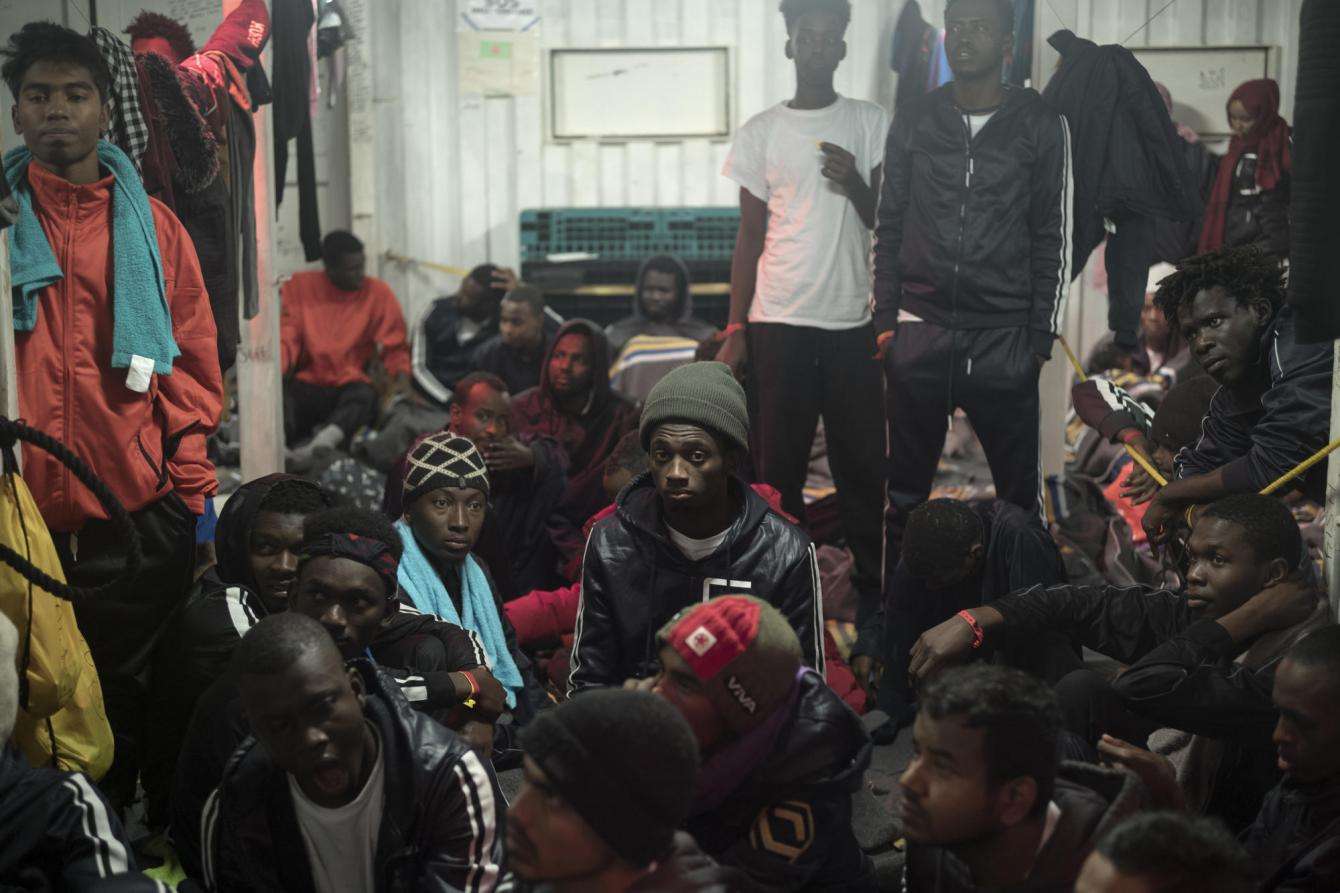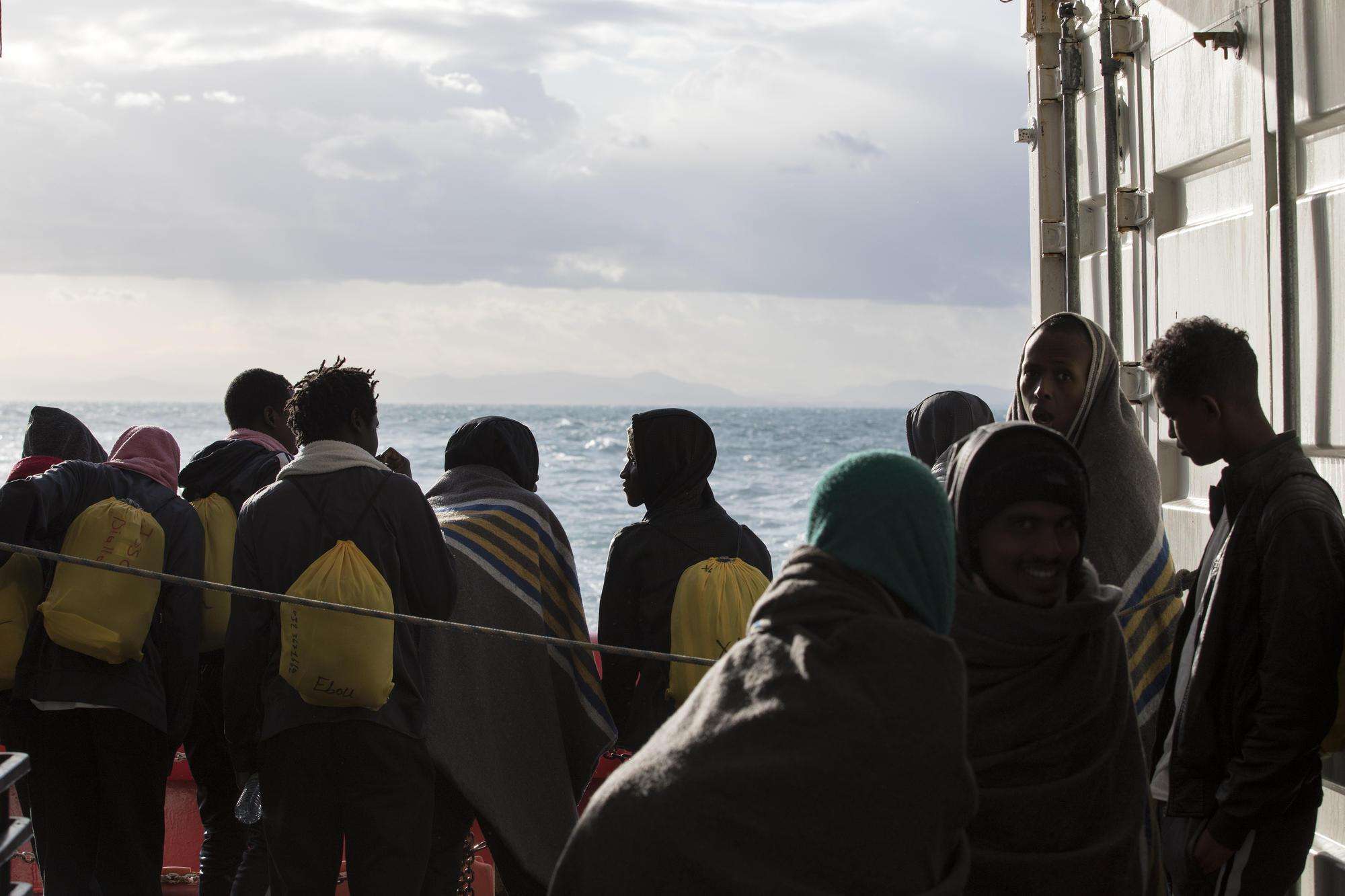Escalating conflict and insecurity in Libya are forcing thousands of people to flee the country, taking their chances on unseaworthy boats in an attempt to cross the Mediterranean Sea. On December 20, 2019, the search and rescue ship Ocean Viking—operated by Doctors Without Borders/Médecins Sans Frontières (MSF) and SOS MEDITERRANEE—rescued 112 people from a rubber boat 32 nautical miles off the Libyan coast. Twenty-one of them had survived a deadly airstrike on Tajoura detention center five months earlier. Their stories, told to MSF on the Ocean Viking, paint a harrowing picture of life in Libya for migrants and refugees: Left in limbo, caught in the crossfire of a country at war, and trapped in an endless cycle of violence.

“We met in Libya,” says Hassan*, a young man with a wide, heart-shaped face. He is part of a group of Somali men and women who have been traveling together. “We were all together in Tajoura detention center.”
Tajoura is one of Libya’s official detention centers, where migrants and refugees are held arbitrarily, often in dire conditions, for an indefinite period of time.
“I’m not a criminal, but I was in prison [in Libya] for three years,” says Hassan. In the detention center, he says he was kept in inhumane conditions, made to do forced labor, and regularly punished by the guards, whom he refers to as “police.”
“There was no sunlight in Tajoura,” says Hassan. “There were women with little babies. We were kept in closed hangars, men and women separate. We were taken out to work all day and returned to the hangar at midnight. We were punished by the police. Women were taken away by police and slapped and raped.”
Faduma, a young Somali woman wearing a red coat and holding a small baby on her lap, nods her head in silent confirmation.
“They don’t respect women, they don’t respect babies, they don’t respect anyone,” says Hassan. “If you try to escape, they shoot you.”
Trapped in conflict
In early April 2019, fighting broke out between forces of the Libyan National Army (LNA) led by Khalifa Haftar and the United Nations-backed Government of National Accord (GNA). In July, the front line moved close to Tajoura, southeast of Tripoli, and both sides launched increasing numbers of airstrikes and drone attacks, including on densely populated areas.

Tajoura detention center, located close to a military depot, was first hit by shelling on the night of May 7, when shrapnel narrowly missed a baby. The UN Refugee Agency called for the detention center to be evacuated.
But two months later, 600 men, women, and children were still locked up in Tajoura when it was hit by two airstrikes on the night of July 2. At least 53 people were killed—making this the deadliest incident for civilians since the conflict began.
“The first airstrike was near to the hangar where I was,” says Faduma, the woman in the red coat. “When it happened, the doors were closed and it was dark. No one came to open the doors, no one came to help us.”
In the ensuing panic, Faduma says that a number of people broke out of the hangar and tried to escape, but were rounded up by guards and locked up again. “People tried to escape,” she says, “then the policemen chased the people and brought them back to a hangar and they shut the people in. Where they shut the people was where the second bomb struck. You couldn’t see anything, just rocks, and blood.”
According to official reports, the victims of the airstrike that hit the men’s hangar were mainly men, but the women’s hangar was also damaged by the blast. Faduma says she was wounded and taken to a hospital along with another woman, Bilan.
“All the people who died, I knew them”
Fifty-three people are known to have died in Tajoura that day, according to the International Organization for Migration (IOM), but the survivors rescued by Ocean Viking report that the number of deaths was almost double that.
“Many people died in Tajoura—more than 100,” says Hassan. “In that hangar there were more than 105 people. All the people who died, I knew them.”
After being discharged from the hospital, both Faduma and Bilan were taken to the UN’s gathering and departure center (known as the GDF) in Tripoli, which was set up in 2018 as a transit center for vulnerable people waiting to be relocated. They were lucky—others had to fend for themselves on the streets of Tripoli. Faduma stayed in the GDF for four months, but eventually she too had to leave. Hassan describes how desperate they all felt. “No help, no work—they don’t know where to go, they don’t know where to move,” he says.

In the past nine months, as the conflict has escalated, more and more migrants and refugees have been left to fend for themselves on the streets of Libya. A handful of Libya’s official detention centers—including Khoms, Karareen, and Qasr Bin Gashir—have been closed down, while people intercepted at sea and returned to Libya by the Libyan coastguard are increasingly being left to cope without assistance.
On the streets, they run the risk of being abducted by criminal gangs, human traffickers, and militias and taken to unofficial detention centers, where they are exposed to physical violence, forced labor, and extortion.
A desperate crossing
Feeling they had run out of options, Hassan and his group of fellow Somalis decided to try and cross the central Mediterranean in a smuggler’s boat, despite the risks. In 2019, according to IOM, 753 people—or an average of two people every day—are known to have died or gone missing in the central Mediterranean, the world’s deadliest migration route.

“When we left the GDF we went straight to the sea,” says Hassan. “We found someone to take us in a boat. We paid around 2,000 dinars [$1,425] each.”
Leaving Libya by sea is fraught with difficulties. Hassan made four separate attempts, but each time his boat was caught by the Libyan coastguard and he was forcibly returned to Libya. The Libyan coastguard is trained and funded by the EU. Hassan says that people at sea are also intercepted by traffickers, who return them to Libya and then sell them to other traffickers.
“Libyan [criminal gangs] abduct people from the sea,” says Hassan, “and lead you back into Libya, to a prison. Then they will sell you. The smuggler will come and say, ‘I need 10 persons. Bring me out 10.’ In front of you he will say: ‘These 10 are yours, take them.’ It’s a slave trade.”
An uncertain future
Faduma, Hassan, and their companions have survived a conflict in their own country, a difficult journey, detention in Libya, a deadly airstrike, and a dangerous voyage across the Mediterranean. Eventually, two days after being rescued by Ocean Viking, Italy agrees to offer them a port of safety.

Waiting to disembark in the southern port of Taranto, the Somalis look expectant and anxious. One by one, clutching bags holding their few possessions, the rescued people step off the gangway. They make their way toward a crowd of officials wearing facemasks and protective suits, a tented city set up hastily on the quay, and the chance to start a new, safer life in Europe.
In the past week, at least 1,100 people have attempted to escape Libya across the Mediterranean Sea. Of these, 602 people—including many women and children—have been intercepted and forcibly returned to Tripoli by the Libyan coastguard. Meanwhile, MSF teams on the ground in Libya report renewed fighting and heavy shelling. There is growing insecurity and no safe place to go.
*All names have been changed to protect anonymity.




